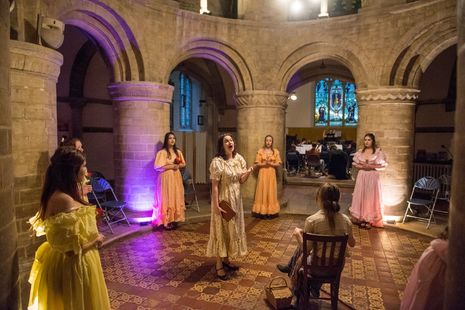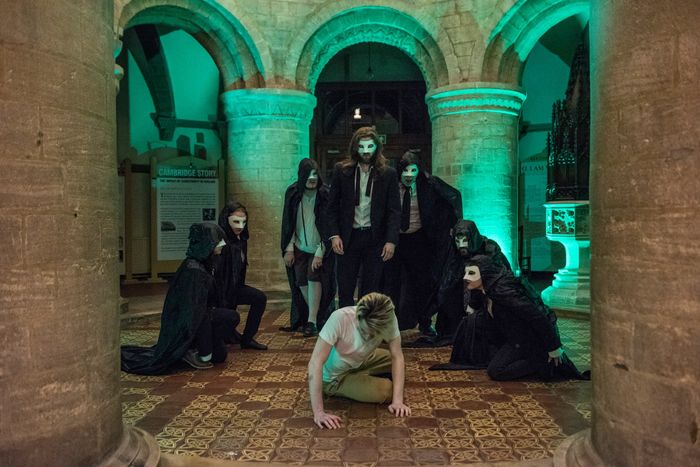‘Ruddigore’ at The Round Church is magnificent
For her first experience at an opera, Poppy Gibbs couldn’t have asked for much more than this spellbinding production

Sometimes things are so much better when they are unexpected. When I arrived at The Round Church, a beautiful medieval stone building in the centre of Cambridge, I had no expectations of what this opera, or any opera for that matter, would entail. Yet Ruddigore was full of joyful surprises — from tap dancing, violin-jigging and an unanticipated amount of laughs, I found myself rapidly enchanted. The band, conducted by Emma Dinnage, guided the audience through the many sensations of this comic opera with grandeur, transitioning seamlessly from the eerie to the emotionally charged.
The band electrified the performance, and the eerie site-specific setting of The Round Church was a blessing for this production, for together they created a dreamy atmosphere. It was easy to gaze up into the dome and feel a part of something great, like the leading Sir Ruthven Murgatroyd (Robert Nicholas) often did himself. Murgatroyd, living in hiding in a Cornish village as Robin Oakapple to avoid the curse placed upon each baronet of Ruddigore, is a young man haunted by the same condemnation as his ancestors. The church itself contributed to the power of Murgatroyd’s confrontation with his ancestors in the second act, where in darkness, he pointed a torch up at each of the gargoyles staring down from the ceiling. His character is observed by the past, and as an audience it felt like so were we.
“Mark Holland’s direction proved opera isn’t a genre to be enjoyed only by a certain few”
The staging was simple, but the purple light bathing the stone walls transformed the setting into something mythical. Simplicity became an opportunity to focus the senses on a performance that transcended its period — removed yet relatable. Every aspect of the performance, even the closing bows, was precisely choreographed; dances felt both neat and spontaneous, and movements were carefully executed. The chorus, dressed in matching bright coloured dresses often moved in unison; both comic and slightly cult-like, it echoed folk horror films like Ari Aster’s Midsommar, connotations that provided Ruddigore with a youthful relevance. Although often on the stage, at no moment did the chorus fail to put everything into their characterisations; expressions of unified outrage, collective gasps and hidden whispers made them a consistently memorable and humorous presence. The chorus ensured that something was always happening on stage, and their whimsical energy made it impossible to look away.
The gothic horror that came in the second act, where the implications of the Ruddigore curse are realised was somewhat softened by comedy, which seemed to prove the dominating force of the performance. Laughter from the audience was plentiful, and I was surprised at how often I found myself laughing with them, perhaps because of my preconception of opera as a drier or more serious art form. As I laughed I began to warm to it as a form. With a self awareness that made it feel like a parody of its own genre, Ruddigore wasn’t held back by taking itself too seriously. Richard Dauntless (Tiffany Charnley) and Oakapple’s (Robert Nicholas) eruption into a jig-turned-violin-performance as well as the character of Dauntless’ repeated justifications to the audience as to why he can be called “Dick” made watching Ruddigore joyful. I was in constant awe of a cast that continued to prove themselves as talented, not only vocally, but in their dance, movement and captivating stage presences.
The only unwelcome surprise of Ruddigore was my failure to realise how long operas are, and by the beginning of the second act I could feel my focus drifting as the story began to drag. Yet for the most part, the captivating performances seemed to make it easier to forget that time was passing. The vocals of the performers combined with the laughter of the audience echoing from the stone walls of the church felt, much like Ruddigore’s story, like a beckoning to question our own place in time.
It was a tale of a young man trapped by the curse of his ancestors staged in a building that has withstood the ages — I felt I was not only watching a performance, but that I too was sitting not too far from those who came before. Mark Holland’s direction provided a youthful relevance that proved opera isn’t a genre to be enjoyed only by a certain few.
Ruddigore is playing at The Round Church from Thursday 27th to Saturday 29th April, 7:45pm
 News / Caius mourns its tree-mendous loss23 December 2025
News / Caius mourns its tree-mendous loss23 December 2025 News / Clare Hall spent over £500k opposing busway 24 December 2025
News / Clare Hall spent over £500k opposing busway 24 December 2025 Comment / Yes, I’m brown – but I have more important things to say22 December 2025
Comment / Yes, I’m brown – but I have more important things to say22 December 2025 Interviews / Politics, your own way: Tilly Middlehurst on speaking out21 December 2025
Interviews / Politics, your own way: Tilly Middlehurst on speaking out21 December 2025 News / King appoints Peterhouse chaplain to Westminster Abbey22 December 2025
News / King appoints Peterhouse chaplain to Westminster Abbey22 December 2025









